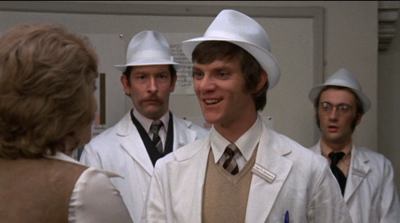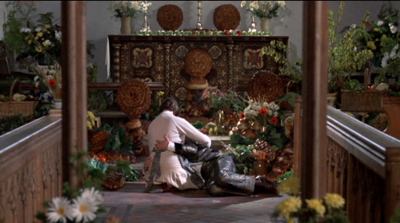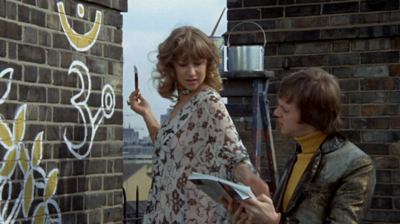O Lucky Man!

A seventies filmic retelling of Candide by director Lindsay Anderson, writer David Sherwin and star Malcolm McDowell, O Lucky Man! is a rare example of the picaresque in cinema. Starting as a coffee salesman, McDowell’s Mick Travis (the same name, but perhaps not quite the same character as he played in If….) journeys through Britain’s regions, classes and professions veering from cynical capitalist to idealistic altruist. Finally he learns that the best one can hope for is to not die like a dog, and that even if our best shot at understanding the variety and confusion of the world is through the imprecision and contariness of art, at least we can turn our attempts into entertainment.
McDowell is ever-present as a boyish, charming everyman, his strange open face and piercing blue eyes the perfect vehicle for a character who can pass through corruption, torture and victimisation and still emerge fresh and apparently innocent on the other side. Around him an ensemble cast, including Arthur Lowe, Ralph Richardson, Mona Washburn and Helen Mirren, recur in multiple roles, bringing the film’s artificiality to the fore.

The absurdism that bubbled under much of If…. before erupting towards the end is present from the start of O Lucky Man! On top of this, Anderson employs various techniques that break the dramatic spell and draw attention to the film’s artifice. There are frequent cuts to black – sometimes in the middle of scenes – and intertitles between episodes. Alan Price wrote and recorded several songs for the film, the lyrics of which form a commentary on Travis’ journey. Footage of Price and his band performing in the studio form the title sequence and are cut into the film, something like a Greek chorus. About halfway through they turn up as characters in their tour bus, with whom Travis hitches a lift.

The tone of the satire is general and has retained its relevance to the UK of 35 years later. Other than the fact that such an ambitious self-consciously arty comedy would not be made in the UK today, the only aspect that seriously dates the movie is when Arthur Lowe appears in blackface playing an African dictator. In context it is less awful than it initially sounds, but it is still an uneasy thing to watch.
Whilst any film of this length attracts criticisms of indiscipline, for much of its length O Lucky Man! is sharp or funny or unexpected. Those with three hours and the inclination to watch something quite unique should be entertained by its blend of allegory and artifice.

Liam, can I ask one of my stupid non-film-person questions, please? If I can’t, don’t read the next bit.
How can someone be innocent and believe that the best for which we can hope is not to die like a dog? Is this one of those sarcasm things that I’ve missed again?
R xxx
Good question, Ros!
It’s a very odd movie. It is, by and large, a satire. We see a lot of the dark side of human nature, and we see a bit of the good side. It’s all shot through with a kind of odd detachment so you don’t spend the movie thinking “gosh, how awful for the poor boy,” and just as you can’t see where it’s going to and it all gets really confusing, everything snaps into focus when the director of the movie slaps the hero across the face with the script. You see, despite its criticisms of human nature, it’s quite a joyful film, too. I guess that’s the crux of absurdism. Yes, we humans are ridiculous, but eventually you’ve got to laugh. Also, I don’t think by the end of the movie that Mick Travis is still innocent, although it takes him an awfully long time to wise up. I think in the end he’s no longer innocent, but he has recovered his hope.
There’s a scene at the beginning of the movie where he and other hopeful coffee salesmen are being trained to smile. To Mick the sincere-fake salesman smile comes naturally and he eagerly puts himself forward to shake the head of PR’s hand and beam a big grin at her. At the end of the movie, during a screen test the director asks him to smile, and says he can’t see what there is to smile about. Then the director smacks him with the script and as he recovers from the shock his mouth slowly starts to kink upwards. There’s a cut to black and then when the picture returns, he’s grinning and dancing with the entire cast and the band/chorus. Clearly the implication is that he’s seen a lot of what the world has to offer, a lot of the awfulness it can dump on you, and realised that ultimately he is lucky to have survived the experience and learned from it. The movie is aiming to be a similar kind of smack round the face for the viewer. This is why the movie is about the redemptive power of art.
The film doesn’t attempt to tell you in dialogue exactly what it is that he has learnt, which is good, because any attempt to encapsulate the previous three hours in a quick soundbite would be trite. And it’s definitely not sarcasm. It’s a much more illuminated movie than that.
Does that go any way towards answering your question?
Any film which features Arthur Lowe in blackface as an African dictator (“Honey?”) has great cult appeal.
Unfortunately, as with so many of these “Life isn’t fair” rants against the world, the film has not dated well. These days it always makes me think of a suburban teenager slamming the bedroom door to make a point about not getting their way. And Britannia Hospital confirmed this view. I would recommend the film to anyone for its cast – Michael Elphick doesn’t even get multiple roles – and for the of-its-time music of Alan Price, but the film doesn’t produce the expected anger (in the way that, say, Paths of Glory does), just annoyance at the director.